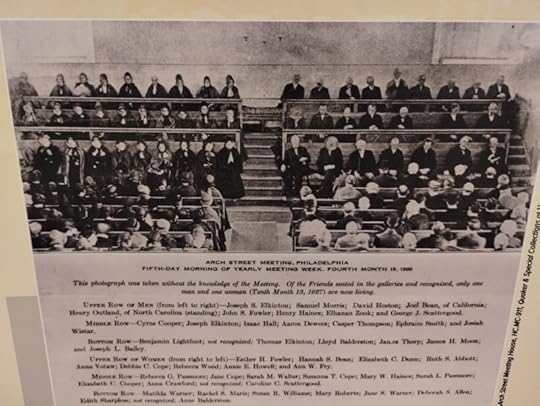Guest Post: Defenders of Light
Guest Post by Ann Goebel

Just recently, I travelled to Philadelphia. One of the days of my trip, I made it a point to spend time going to various old churches in the city. I was really excited to see the Arch Street Meeting House where the Religious Society of Friends (Quakers) meet. I know very little about this religion, but I have always been intrigued by descriptions of quiet and contemplative religious services and the mention of many Quaker communities being LGBTQ friendly. Now, I am sure this faith tradition and its members are imperfect in their own ways, and I would hate to overly idealize them. However, I anticipated that I would fill my spiritual cup that day.
When I arrived, I noticed a sign posted in the grass announcing that immigrants were welcome. I smiled, and continued indoors. The man behind the front desk was kind and inviting, and I felt welcome. To my understanding, the meeting house is still in use today, but the first floor is a beautifully simple museum with signs posted explaining the history of the building and Quaker beliefs.
I learned that this Society of Friends was a group of pacifists, but there was a group that split off during the Revolutionary War because they wanted to take a more active role in the fight for sovereignty. I learned that Quakers believe in an Inner Light, which some identify as the Christian God while others view as a general divinity and spirituality found within us all. I learned that Quakers were vocal abolitionists of slavery and have a tradition of fighting for social justice.
I was quiet as I explored the rooms, enjoying learning from these signs and then taking in the quiet reverence of the space. As I pondered, I wandered over to the front of where the congregation would meet to read a final sign. I read these Quakers did not typically have one person designated to address the congregation, but there would be a community of people on the stand. I looked at the rows in front of me (three or four rows with a middle aisle creating six or eight long benches), and I smiled at that idea of communal teaching.
My gaze returned to the sign, and I inspected the black and white photograph more closely. Before I could fully process what I was seeing, tears filled my eyes. The left half of the front benches were filled entirely with women! I did a double take, and reread the sign.

To my amazement, it made no mention of equal gender representation! I was shocked. I knew, of course, that many religious groups have female ordination, and I was well-aware of the LDS Women on the Stand movement. But what most shocked me was the nonchalant way that it was not even mentioned, as if it was not the huge accomplishment that I had come to believe it is. Nothing in the sign said, “look at how awesome we are that we look for equal gender representation! How amazing that we have accomplished something so wildly progressive!” In this space, this small act of gender equality was not treated like a huge modern feat but a common-sense way of living and worshipping.
I sat in a pew and wept for a few minutes, my heart aching. Is this what I’ve been missing out on all this time? How often have I taught myself to fight for and be profoundly grateful for mere breadcrumbs? If my church experienced this kind of egalitarian leadership and representation, is this the kind of environment we would create? One that is safe for immigrants, safe for sexual and gender minorities, safe for women, safe for African Americans, safe for the poor, safe for all?
As I sat there, I imagined strong women and men who have been empowered through Quakerism, their personal spirituality and faith community helping them use their talents for meaningful social causes. I closed my eyes, filled with both pain and sorrow for my own church’s long-standing oppression of women. But through that pain, I felt gratitude for that moment and a deep spiritual connection to something. In that Quaker meeting house, I imagined I was seen and known by something bigger than myself. I pictured warm, expansive light filling my soul, and it called on me to let my light so shine. It called on me to not hide it under a bushel, but to share it. It asked me to defend that light in my brothers and sisters.
Ann Goebel is grateful for the spiritual education she received as a youth in her progressive Mormon household. Her undergrad is in political science, and she loves thinking about how different institutions impact our lives (even though it often makes her anxious). She enjoys spending time with her husband, calling her grandma, birdwatching, discussing books with friends, and eating mapo tofu.



